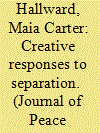|
|
|
Sort Order |
|
|
|
Items / Page
|
|
|
|
|
|
|
| Srl | Item |
| 1 |
ID:
090139


|
|
|
|
|
| Publication |
2009.
|
| Summary/Abstract |
This article examines creative ways in which Israeli and Palestinian activists engage with each other and the powers seeking to separate them in their nonviolent struggles for a just and lasting peace. Using the geopolitical theory of territoriality, the article briefly examines a number of administrative, physical, and psychological barriers facing joint activism and the strategies activists use to counteract them. Drawing on nonviolent theory and practice, the article analyzes how activists exert power through the creative use of symbols and practices that undermine the legitimacy of occupation policies. Based on fieldwork conducted in 2004-05 and July 2006, the article explores the implications of this activism on conceptions of identity, and strategies for restarting a moribund peace process. The relative `success' of sustained joint action in Bil'in can provide scholars and policymakers with innovative approaches for addressing some of the outstanding issues needing to be addressed by official negotiators. Although government bodies are more constrained than activists, the imaginative means of engaging with the system - and the reframing of issues through the redeployment of `commonplaces' - can perhaps provide inspiration, if not leverage, for thinking outside of the box.
|
|
|
|
|
|
|
|
|
|
|
|
|
|
|
|
| 2 |
ID:
104803


|
|
|
|
|
| Publication |
Norway, International peace research Institute, 2008.
|
| Description |
v, 81p.
|
| Series |
PCC paper 2/2008
|
| Standard Number |
9788272882777
|
|
|
|
|
|
|
|
|
|
|
|
Copies: C:1/I:0,R:0,Q:0
Circulation
| Accession# | Call# | Current Location | Status | Policy | Location |
| 056053 | 382.9095645/HAT 056053 | Main | On Shelf | General | |
|
|
|
|
| 3 |
ID:
178455


|
|
|
|
|
| Summary/Abstract |
Negotiations aimed at resolving international disputes often end in deadlock. In the current article, we focus on deadlocks triggered by missed opportunities. The consequences of missing an advantageous opportunity have been studied extensively in the field of psychology within the context of the inaction inertia effect. The concept was recently introduced into the negotiation literature. Forgoing an attractive action opportunity creates vulnerability to regret and increases the likelihood of forgoing subsequent inferior opportunities, even if they still have positive value. The current article deepens the applicability of inaction inertia to international negotiations, by adopting a new multi-step multi-issue paradigm, which better approximates real-life negotiations. Using the new platform, we demonstrate the inaction inertia effect in a dynamic negotiation setting and link an individual’s inertia mindset to the experience of regret. The methodology and analysis presented will help researchers and practitioners explain inertia-induced deadlocks, and facilitate interventions that expedite successful resolutions.
|
|
|
|
|
|
|
|
|
|
|
|
|
|
|
|
| 4 |
ID:
160525


|
|
|
|
|
| Summary/Abstract |
Does individual-level exposure to political violence prompt conciliatory attitudes? Does the answer vary by phase of conflict? The study uses longitudinal primary datasets to test the hypothesis that conflict-related experiences impact conciliation. Data were collected from Israeli Jews, Palestinians, and Protestants and Catholics in Northern Ireland. Across both contexts, and among both parties to each conflict, psychological distress and threat perceptions had a polarizing effect on conciliatory preferences. The study highlights that experiences of political violence are potentially a crucial source of psychological distress, and consequently, a continuing barrier to peace. This has implications in peacemaking, implying that alongside removing the real threat of violence, peacemakers must also work toward the social and political inclusion of those most affected by previous violence.
|
|
|
|
|
|
|
|
|
|
|
|
|
|
|
|
|
|
|
|
|